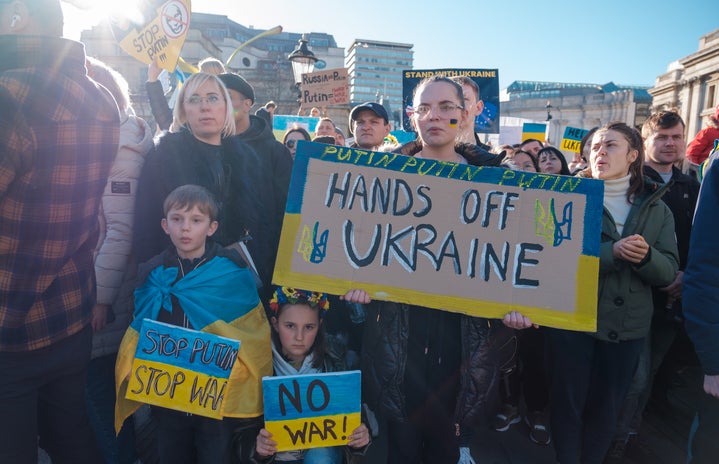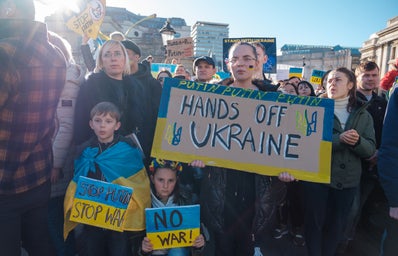If you’ve been on social media the past month, you’ve likely seen stories and posts about how to best help Ukrainians amidst the current Russian invasion. Support is always a good thing, however, there has been less information about crisis itself, how it started, and where it currently stands. To best support a country and its citizens, you’ve got to know what exactly you’re aiding, where your aid is going and how you’re helping the cause at hand.
Where it all started
The current conflict didn’t start a month ago. It actually started after the collapse of the Soviet Union in 1991. When NATO, an organization with the mission to expand freedom and political security, extended membership to the former Soviet states and hinted at Ukraine possibly joining, Russia saw it as a threat. Russia has always considered Ukraine a “part of Russia” so joining NATO was out of the question. This is especially true considering that in recent years, NATO has been increasingly distancing itself from interference in Russia.
The 2013 Russian annexation of Crimea, a peninsula in Eastern Europe with a population of around 2 million, only intensified the conflict as Russia seized control of more land despite angering NATO and other countries. Ukraine considered itself the next target of Russia after Crimea. Since then, Russia and Ukraine have experienced a tense border, with Russia amassing troops on the border months before the recent invasion.
Essentially, most of the present conflict is due to the fact that Vladimir Putin, President of Russia, considers Ukraine to be a Russian entity—its land, its people, and the entirety of the country is an extension of Russia. Therefore, Russia is invading in order to take back what they claim is rightfully theirs. Obviously, Ukraine is a sovereign and recognized nation, so “taking” the country “back” isn’t really an option for Russia diplomatically, leading to the crisis we’re currently witnessing.
The Current State of the Conflict
The current President of Ukraine, Volodymyr Zelensky, spoke with Congress and Biden on March 16th, pleading for help. Ukraine and Russia have met for peace talks, but little resolution has come from them. Countries around the world are experiencing anti-war, pro-Ukraine protests, and world leaders are trying to figure out how best to support the nation without inadvertently aiding Russian forces (CFR). Due to threat of Russian airstrikes, millions of Ukrainians have fled the country under a refugee status.
The current crisis also explains the spike in fuel prices that we’ve all been hating—the U.S. banned Russian oil and gas imports to cut their main revenue source. The U.S. isn’t the only one to do this—dozens of nations have stood in solidarity by cutting Russian imports, resulting in higher fuel prices.
The EU, The United States and other major foreign powers have upped financial aid to Ukraine, with the EU planning to send another 500 million euros. Even though Ukraine seems open to compromise with Russia, a ceasefire doesn’t seem to be in sight any time soon.
One of the scariest parts of the conflict is the fact that many Russians who actually back Ukraine are being censored or fed misinformation. Russian media sources are unable to report on the war, so many Russians are left completely in the dark about what’s going on. There are thousands if not millions of Russians who do not want this crisis to be occurring, yet because they don’t see the media images or videos of what’s happening in Ukraine, they are left defenseless and uninformed.
So…What Can We Do?
It’s tricky to understand what exactly we can do, especially when in the grand scheme of things our efforts seem small. But even by reading this article, you’re doing something important—educating yourself! One of the first things you can do is become more aware of what exactly is happening and view sources with accurate information. Many are calling this one of the greatest crises in modern European history, and it’s time we start treating it like that. Another thing you can do is donate to organizations like Voices of Children, Doctors Without Borders, the Ukraine Crisis Fund, and others. Finally, you can support Ukrainian voices on social media, particularly those reporting daily on the crisis from inside Ukraine’s borders. Uplifting these voices helps disseminate their messages and allows first-person testimonies to reach as many people as possible.
You don’t have to be super political or well-versed in international affairs to want to know how to help Ukraine. You also don’t have to be an expert in the crisis in order to make a difference. Knowing even a small amount and being able to share that information with others allows change to happen and keeps people informed about the world around them. The only way for this crisis to end is with the support of the international community— and that starts with all of us.

